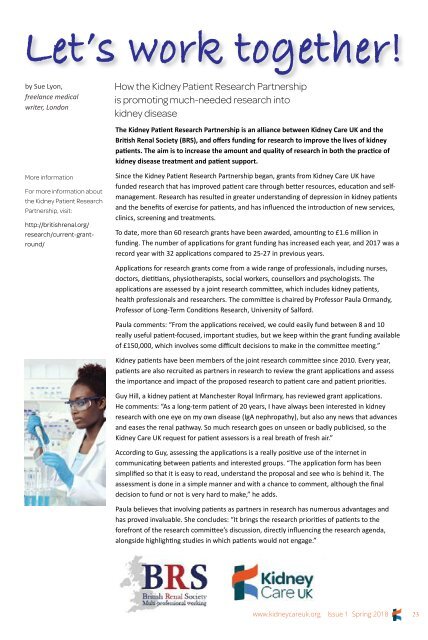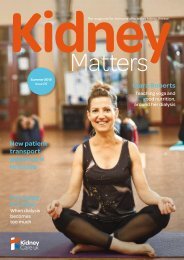Kidney Matters - Issue 1, Spring 2018
Kidney Matters is a quarterly magazine for everyone affected by kidney disease in the UK. We know that being a kidney patient can be tough at times and that accessing the right help at the right time isn’t always easy. We’ve spent a great deal of time over the past year talking to kidney patients on dialysis, asking them what we can do to address this. The response was overwhelmingly ‘improved communication’ on what is going on in the kidney world and what is available to them in terms of support and how to access it. Kidney Matters has been developed to tackle this as well as the many other issues kidney patients face in day-to-day life. Along with shared patient experiences, Kidney Matters provides on how to access emotional and practical support, financial assistance through our grant schemes, advice from leading kidney specialists and tips on how to keep as well as possible by eating a healthy diet whilst on dialysis
Kidney Matters is a quarterly magazine for everyone affected by kidney disease in the UK.
We know that being a kidney patient can be tough at times and that accessing the right help at the right time isn’t always easy. We’ve spent a great deal of time over the past year talking to kidney patients on dialysis, asking them what we can do to address this. The response was overwhelmingly ‘improved communication’ on what is going on in the kidney world and what is available to them in terms of support and how to access it.
Kidney Matters has been developed to tackle this as well as the many other issues kidney patients face in day-to-day life. Along with shared patient experiences, Kidney Matters provides on how to access emotional and practical support, financial assistance through our grant schemes, advice from leading kidney specialists and tips on how to keep as well as possible by eating a healthy diet whilst on dialysis
Create successful ePaper yourself
Turn your PDF publications into a flip-book with our unique Google optimized e-Paper software.
Let’s work together!<br />
by Sue Lyon,<br />
freelance medical<br />
writer, London<br />
More information<br />
For more information about<br />
the <strong>Kidney</strong> Patient Research<br />
Partnership, visit:<br />
http://britishrenal.org/<br />
research/current-grantround/<br />
How the <strong>Kidney</strong> Patient Research Partnership<br />
is promoting much-needed research into<br />
kidney disease<br />
The <strong>Kidney</strong> Patient Research Partnership is an alliance between <strong>Kidney</strong> Care UK and the<br />
British Renal Society (BRS), and offers funding for research to improve the lives of kidney<br />
patients. The aim is to increase the amount and quality of research in both the practice of<br />
kidney disease treatment and patient support.<br />
Since the <strong>Kidney</strong> Patient Research Partnership began, grants from <strong>Kidney</strong> Care UK have<br />
funded research that has improved patient care through better resources, education and selfmanagement.<br />
Research has resulted in greater understanding of depression in kidney patients<br />
and the benefits of exercise for patients, and has influenced the introduction of new services,<br />
clinics, screening and treatments.<br />
To date, more than 60 research grants have been awarded, amounting to £1.6 million in<br />
funding. The number of applications for grant funding has increased each year, and 2017 was a<br />
record year with 32 applications compared to 25-27 in previous years.<br />
Applications for research grants come from a wide range of professionals, including nurses,<br />
doctors, dietitians, physiotherapists, social workers, counsellors and psychologists. The<br />
applications are assessed by a joint research committee, which includes kidney patients,<br />
health professionals and researchers. The committee is chaired by Professor Paula Ormandy,<br />
Professor of Long-Term Conditions Research, University of Salford.<br />
Paula comments: “From the applications received, we could easily fund between 8 and 10<br />
really useful patient-focused, important studies, but we keep within the grant funding available<br />
of £150,000, which involves some difficult decisions to make in the committee meeting.”<br />
<strong>Kidney</strong> patients have been members of the joint research committee since 2010. Every year,<br />
patients are also recruited as partners in research to review the grant applications and assess<br />
the importance and impact of the proposed research to patient care and patient priorities.<br />
Guy Hill, a kidney patient at Manchester Royal Infirmary, has reviewed grant applications.<br />
He comments: “As a long-term patient of 20 years, I have always been interested in kidney<br />
research with one eye on my own disease (IgA nephropathy), but also any news that advances<br />
and eases the renal pathway. So much research goes on unseen or badly publicised, so the<br />
<strong>Kidney</strong> Care UK request for patient assessors is a real breath of fresh air.”<br />
According to Guy, assessing the applications is a really positive use of the internet in<br />
communicating between patients and interested groups. “The application form has been<br />
simplified so that it is easy to read, understand the proposal and see who is behind it. The<br />
assessment is done in a simple manner and with a chance to comment, although the final<br />
decision to fund or not is very hard to make,” he adds.<br />
Paula believes that involving patients as partners in research has numerous advantages and<br />
has proved invaluable. She concludes: “It brings the research priorities of patients to the<br />
forefront of the research committee’s discussion, directly influencing the research agenda,<br />
alongside highlighting studies in which patients would not engage.”<br />
www.kidneycareuk.org <strong>Issue</strong> 1 <strong>Spring</strong> <strong>2018</strong> 23


















